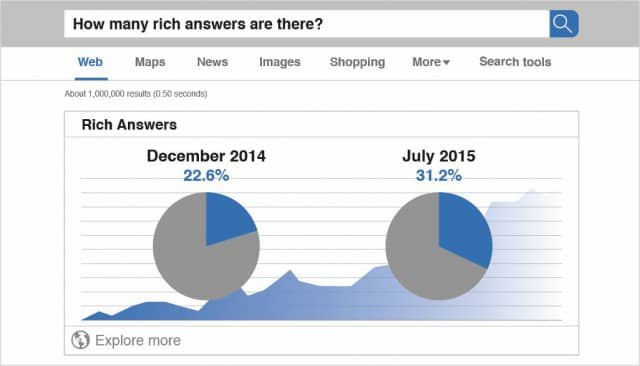This episode of #AuthorityLabsLive was originally streamed live on January 13 with featured guest Eric Enge of Stone Temple Consulting and hosted by Melissa Fach, produced by Michelle Stinson Ross. Below we a have a quick written recap and the video from the hangout.
The Recap
Melissa Fach: What are rich snippets and knowledge graph results in search?
Eric starts out by showing examples of the differences between knowledge graph results and featured snippet results. You will want to be sure and watch the video to see his screen shares. Both types of search results feature at the top of the page ahead of paid and organic placements. Rich snippets in particular are what the name implies, snippets of content from a single web page. The snippet has been deemed the best answer to the question posed in the search query and includes the link to the full page where the snippet of content was found. A knowledge graph result, however, tends to be information gleaned from all over the web and presented with no link to a specific page. These results seem to be more along the lines of “common knowledge” or public domain information. The example Eric shows is a result for the query, “how many quarts in a gallon.” In this case there is no one page that can say they are an authority on or owner of that specific information. The easiest way to tell them apart is to look for a link to more. If that link is to a specific page quoted in the result, then it’s a rich snippet.
Melissa Fach: If a site owner wanted to get a featured result, what would you recommend?
Eric says that there are a few simple things site owners/developers can do to earn a featured placement. First, identify a simple, straight-forward question in your market space. Then, craft an equally simple and straight-forward answer to that question. The content that you’re preparing needs to be a full answer to the question and address related issues with that particular question and answer occurring somewhere on that page in a very focused spot. That answer could be a bulleted list or a paragraph, but it needs to be very easy for both users and Google to find on the page. You also need to get that page ranking organically within the top 10 for that query. Some sort of focal authority and reasonable overall quality of the entire website need to exist. Google won’t look at a poor quality site for a rich snippet result.
Melissa Fach: Do Siri, Cortana, and Google Voice search present the same information as a desktop search?
According to the study they did at Stone Temple Consulting, a Google voice search was more likely to present a rich snippet result than a desktop search for the same query. For Bing’s Cortana on the other hand was less likely to respond with rich response than a desktop Bing search. Google was definitely king of the hill when it came to overall percentages of response with a rich result, Siri came in second, Bing third.
Michelle Stinson Ross: Please tell us about the increase in presentation of rich snippet results over the time you have been studying this.

Over the period of the study, they’ve seen a increase of about 45% in rich answer results of some kind, either a rich snippet attributed to a particular page or a general knowledge unattributed result. He says that if they ran this test again right now, they would expect to see another significant uptick in these types of rich results. Generally speaking, Google finds that the rich answers are working very well for them. For Google it is all about the success in user engagement and experience. Google’s revenue goes up whenever they get better user engagement. This is not something that is going to go away like some of the other results they’ve tested and then dropped.
Eric had a great deal of specific data and information to share about how this “super organic placement” works and how SEOs and businesses need to implement content to earn these types of search results. Be sure and check out the entire video or listen to the podcast, and share your thoughts in the comments below.
Video and Podcast

